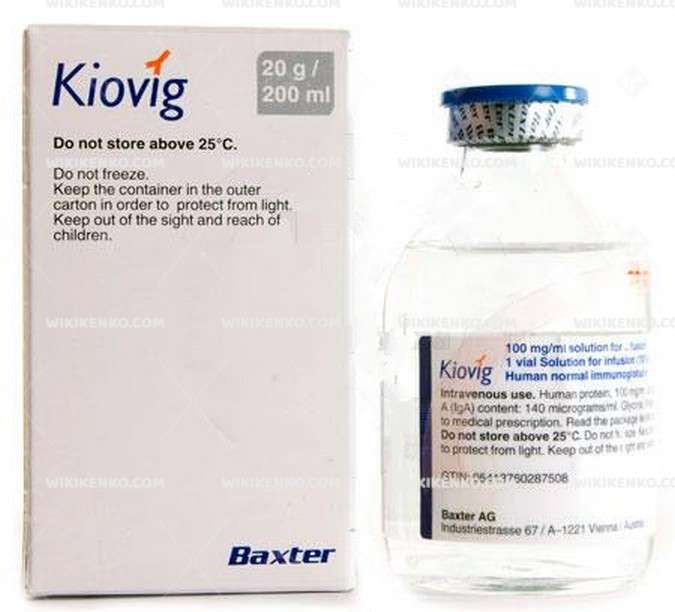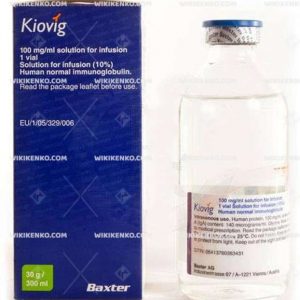Description
Kiovig is a brand name for a human normal immunoglobulin (IVIg) solution available in different sizes, ranging from 1g/10ml to 30g/300ml. These variations cater to a multitude of medical needs, offering flexibility and precision in treatment.
Indications and Prescription Practices
Immunoglobulins, including Kiovig, are prescribed by brand name, and it is the duty of the attending clinician to specify the brand, indication, daily dose, and treatment duration in the patient’s medical records. Kiovig is the preferred choice for Multifocal Motor Neuropathy and individuals requiring a sugar-free option due to conditions like renal failure or diabetes. In certain cases, consultants may request Kiovig for other specific indications.
Dosage and Administration
The dosage of Kiovig typically ranges from 0.4g/kg/day for 5 days to 1-2g/kg/day, as directed by a consultant neurologist or hematologist. The duration and frequency of administration are also tailored to the patient’s needs, with the total dose rounded down to the nearest vial size available. Patients with a body mass index (BMI) exceeding 30 may require dose adjustments.
Administration
Kiovig administration demands precision. Initially, it is infused at a rate of 0.5ml/kg/hr for 30 minutes, gradually escalating to 1ml/kg/hr, 2ml/kg/hr, 4ml/kg/hr, and finally 6ml/kg/hr for the remainder of the infusion. However, in patients at risk of acute renal failure or thromboembolic adverse reactions, the lowest feasible infusion rate and dose should be employed. Any occurrence of side effects mandates a reduction in the infusion rate, or in severe cases, temporary discontinuation. The infusion should never be shaken, and it must be used immediately upon preparation, ensuring it reaches room temperature beforehand. Critical details, such as the name and product batch number, should be diligently recorded on the IV infusion chart.
Adverse Events
Kiovig infusion may lead to several side effects, encompassing chills, hypothermia, headache, fever, vomiting, rash, nausea, fatigue, arthralgia, and fluctuations in blood pressure. The appropriate response to such adverse reactions hinges on their nature and severity.
Monitoring for Safety
Frequent monitoring is essential during Kiovig infusion. Vital signs, including blood pressure, heart rate, oxygen saturation, respiratory rate, and temperature, should be assessed at specific intervals. Additionally, Urea and Electrolytes (U & Es) are evaluated before the initial infusion, prior to doses on days 3 and 5, and once within 0-3 days after completing the infusion course. Patients with renal failure or diabetes may require daily U & Es throughout the infusion course, on the day of completion, and 3 days post-completion.
Side Effects
Kiovig may entail certain side effects, predominantly infusion-related adverse events. These may encompass chills, hypothermia, headache, fever, vomiting, rash, nausea, fatigue, arthralgia, and alterations in blood pressure. The management of these side effects hinges on their nature and severity. It is imperative to maintain an open line of communication with your healthcare provider and promptly address any concerns.
Operating After Infusion
Driving or operating heavy machinery immediately after a Kiovig infusion is not recommended. The medication can induce dizziness, drowsiness, or fluctuations in blood pressure, potentially impairing one’s ability to engage in such activities safely. It is advised to consult with your healthcare provider and adhere to their guidance in this regard.
Conclusion
In conclusion, Kiovig stands as a crucial asset in the realm of medical treatment, offering an array of sizes to accommodate various needs. Its precise indications, dosages, administration protocols, and vigilant monitoring ensure its safe and effective use. By understanding its potential side effects and adhering to prescribed guidelines, patients can harness the therapeutic potential of Kiovig, enhancing their well-being while prioritizing their health and safety.












Carolina –
hola es que necesito para Colombia el medicamento kiovig urgente le agradezco la información
Medical Guidance Center –
Hola Carolina, this is Wikikenko.
Si deseas conocer la disponibilidad de este producto, por favor completa el formulario de “Urgent Quotation” para que podamos ayudarte a encontrarlo en Colombia.